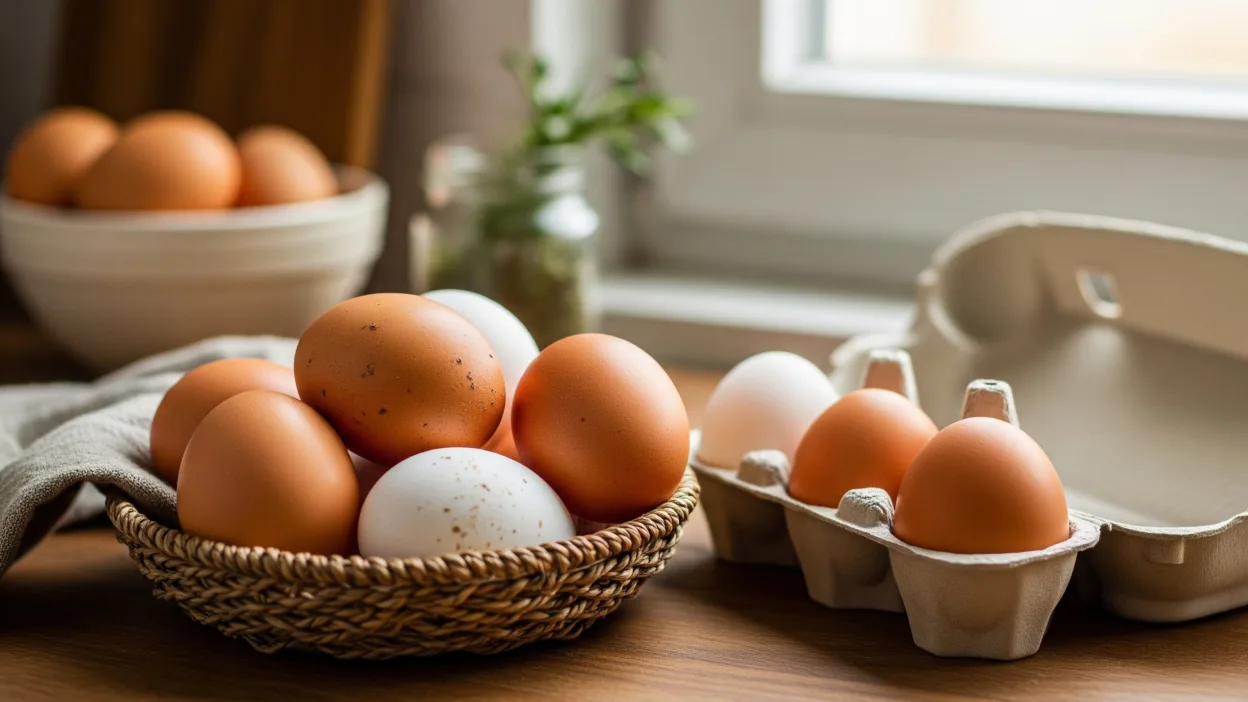If you raise backyard chickens or buy farm fresh eggs, knowing how to store them properly is key to keeping them fresh, safe, and flavorful for longer. Unlike store bought eggs, fresh eggs often have a protective coating that affects how they should be stored. In this guide, we’ll explore the best methods to store fresh eggs at home, whether you prefer them on the counter or in the fridge.
Understanding the Bloom: Nature’s Protective Layer
Freshly laid eggs have a natural coating called the bloom or cuticle. This invisible layer seals the eggshell pores, preventing bacteria from entering and locking in moisture.
- Unwashed eggs can be stored at room temperature for weeks.
- Washed eggs lose the bloom and should always be refrigerated.
Method 1: Room Temperature Storage for Unwashed Eggs
If your eggs are straight from the nest and unwashed, you can store them at room temperature for up to 2–3 weeks.
- Keep them in a cool, dry place away from direct sunlight.
- Use a ceramic egg holder or carton to protect them from breakage.
- Rotate eggs so the oldest get used first.
Tip: Always store eggs with the pointed side down to keep the yolk centered and fresh.
Method 2: Refrigeration for Washed or Store Bought Eggs
Refrigeration is the safest and most common method for egg storage. It slows bacterial growth and keeps eggs fresh for 4–6 weeks.
- Place eggs in the main body of the fridge, not the door, to maintain a consistent temperature.
- Store in their original carton to prevent moisture loss and odor absorption.
- Label the carton with the collection date for freshness tracking.
Method 3: Water Glassing for Long-Term Storage
Water glassing is an old fashioned method perfect for preserving fresh, unwashed eggs for up to a year.
- Mix hydrated lime (calcium hydroxide) with water in a clean food-grade container.
- Submerge unwashed eggs completely in the solution.
- Keep the container in a cool, dark place.
Method 4: Freezing Eggs for Baking or Cooking
If you have more eggs than you can use, freezing is a great option.
- Crack eggs into a bowl and whisk until blended.
- Pour into ice cube trays or freezer-safe containers.
- Thaw in the refrigerator before using.
Note: Freezing changes the texture slightly, so frozen eggs are best for baking or scrambled dishes.
Method 5: Pickling Eggs for a Tangy Treat
Pickled eggs not only store well but also make a delicious snack.
- Boil and peel fresh eggs.
- Submerge in vinegar-based brine with spices.
- Store in the refrigerator for up to 3–4 months.
How to Tell if Eggs Are Still Fresh
Use the float test:
- Fill a bowl with water and place the egg in it.
- Fresh eggs sink and lie flat.
- Older eggs stand upright or float, these should be used quickly or discarded.
Final Thoughts
The best method to store fresh eggs at home depends on whether they’re washed, how quickly you plan to use them, and your available storage space. Room temperature storage, refrigeration, water glassing, freezing, and pickling all offer safe and effective ways to keep your eggs fresh. With the right technique, you can enjoy delicious eggs from your backyard or local farm all year round.



